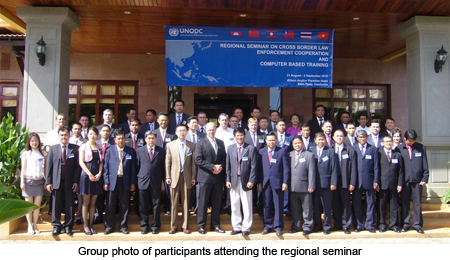Responding to countries' needs, UNODC expands the scope of border liaison projects

Siem Reap (Cambodia), 11 October 2010 - After 11 years of strengthening border liaison offices in six countries (Cambodia, China, the Lao People's Democratic Republic, Myanmar, Thailand and Viet Nam), the UNODC project entitled "Consolidation and enhancement of the border liaison office mechanism in East Asia" has been evaluated.
The results of that evaluation were shared at a regional seminar on cross-border law enforcement cooperation and computer-based training held in Siem Reap, Cambodia from 31 August to 2 September.
During the meeting, UNODC representatives presented the summary findings and recommendations emerging from the external evaluation and encouraged participants to discuss the sustainability of both border liaison offices and related computer-based training operations in each country.
The evaluation found that there was an immense need to improve border liaison office data management systems, data collection, documentation and reporting of seizures and arrests.
During the meeting, Lieutenant General Moek Dara, Secretary General of the National Authority for Combating Drugs of Cambodia said: "After the border liaison office was established, cross-border cooperation was gradually strengthened. The capacity of front-line law enforcement officers has been improved through computer-based training programmes, thus trafficking of drugs across the borders has been significantly reduced."
Gary Lewis, UNODC Regional Representative for East Asia and the Pacific, also emphasized the importance of cross-border cooperation, saying that "there is a need to expand our border control to improve border security on smuggling of migrants and trafficking in people, drugs and natural resources across the region."
Representatives from each country urged UNODC to produce additional computer-based training modules on topics such as smuggling of migrants and environmental crime, supporting a broadening of the scope of work from drugs to other transnational organized crimes. In addition, UNODC was asked by representatives to provide a mobile training team to facilitate the training of law enforcement and front-line officers.
The findings and recommendations of the expert evaluation, as well as the requests made by country representatives, will be incorporated into a new UNODC project
"Partnership against transnational crime through regional organized law enforcement", which will cover not only drugs but also smuggling of migrants, trafficking in persons and environmental crime.
